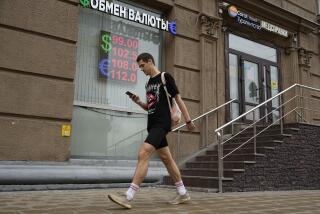Eurozone faces dangers of deflation as prices fall
- Share via
The Eurozone has a new economic headache to contend with.
Consumer prices fell in December in the currency bloc for the first time in over five years, raising concerns of a protracted drop that can hurt growth, and reinforcing expectations that the European Central Bank will provide an aggressive stimulus.
Lower energy costs pushed consumer prices down 0.2% in the month from the year before, according to a report Wednesday by the Eurostat statistics agency. That’s a big drop from the 0.3% annual rise in prices recorded in November and the 0.1% drop markets were expecting.
The huge effect of weaker oil prices is evident in the fact that the core inflation rate, which excludes volatile items such as food, tobacco and energy, rose to 0.8% from 0.7%.
Lower prices may sound good in principle, especially if they are due to a fall in oil prices — the euros saved filling up a car for less can be used elsewhere, promoting economic activity. For a region stuttering from one quarter of anemic growth to the next, every bit helps.
The problem arises when the fall in prices endures, a situation that is often referred to as a deflationary spiral. That can choke the life out of an economy if consumers put off purchases in the hope of future bargains. It can erode companies’ profits and make governments’ debts appear greater.
Deflation can also prove difficult to reverse, as evidenced by the case of Japan, whose economy has stagnated for two decades.
Policymakers at the ECB will weigh these factors when they meet Jan. 22. Many in the markets think they will be fretting about deflation as the Eurozone, which now counts 19 members following Lithuania’s adoption of the currency this year, has seen low inflation for months amid subdued growth and high unemployment. Separate figures Wednesday showed unemployment across the Eurozone remained at a high 11.5% in November.
As a result, many economists think the ECB will this month back a stimulus program that involves government bond-buying, something other central banks such as the U.S. Federal Reserve and the Bank of England have done over the last few years. The ECB, after all, doesn’t have much left in its arsenal, having already cut interest rates to record lows and backed the purchase of some private-sector bonds.
Expectation for more stimulus has weighed heavily on the euro, which hit a new nine-year low of $1.1802 on Wednesday. Because the stimulus would create new money, traders are selling the currency on the prospect of more euros in circulation.
“The emergence of negative inflation does forcefully raise the specter of a possible prolonged period of deflation,” said James Ashley, chief European economist at RBC Capital Markets. “For those policymakers who, hitherto, might have been undecided over whether or not to take further action immediately, this may be just the clarion call that was required to appreciate the gravity of the situation.”
More to Read
Inside the business of entertainment
The Wide Shot brings you news, analysis and insights on everything from streaming wars to production — and what it all means for the future.
You may occasionally receive promotional content from the Los Angeles Times.










